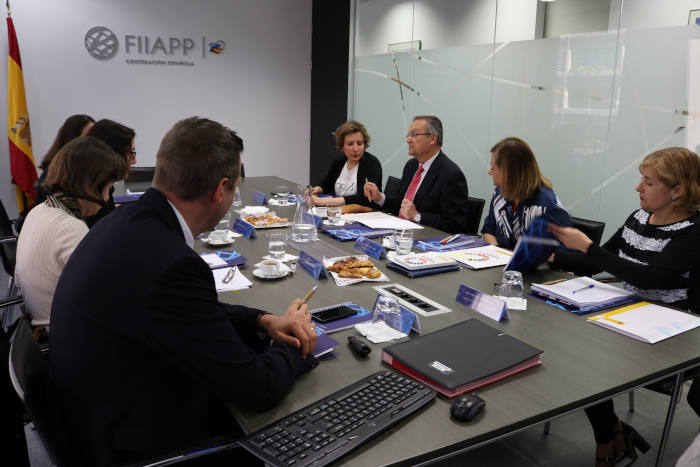
13/05/2019
The High Commissioner for Agenda 2030 has met with FIIAPP employees to address the importance of Agenda 2030 and ODS compliance
The High Commissioner for the 2030 Agenda, Cristina Gallach, has met with FIIAPP employees. During this meeting Ms Gallach indicated that Spain is in the process of launching the governance structure for the implementation of the 2030 Agenda. She also highlighted three key aspects in the creation of this structure: leadership from top political authorities to direct and pilot the strategy to be implemented, coordination between all the parties involved including Spain’s autonomous regions and local entities and, finally, the necessary support from civil society.
The High Commissioner then drew attention to the multidisciplinary and multilevel nature of the Agenda and that “we must ensure that every public stakeholder (agencies, bodies, institutions) embraces the Agenda, familiarises itself with its contents and views its obligations and actions through the SDG prism”.
She then went on to point out the importance of measuring results and that the 2030 Agenda “brand” favours the use of a common language at the international level, facilitates communication with the different stakeholders and advocates the monitoring of compliance with the goals. She also went out of her way to mention the relevance of its policies, both internal and external: “the entire role of Spain’s foreign policy and, in particular, that of FIIAPP, which has now established its place within the perspective of the Agenda and in which it plays a fundamental, energetic and vigorous role, is of vital importance”.

After the meeting, the Standing Committee, namely FIIAPP’s governing, representative and administrative body, chaired by the Secretary of State for International Cooperation and for Ibero-America and the Caribbean, Mr Juan Pablo de Laiglesia y González de Peredo, tackled subjects of both a strategic and operational nature.
These included the results of the activities performed by FIIAPP, with the following achievements being highlighted: its geographical presence in 129 countries, an average workforce of 225 people, a multi-year project execution budget of 311 million euros, the allocation of 73.7 million euros in 2018 and an annual budget execution of 61 million euros.
In addition, the Standing Committee reviewed the progress made regarding the operational priorities established by the Board of Trustees in matters of equality (disability equality and mainstreaming plan), advances in the knowledge management work plan, ecological transition (Euroclima+ programme and SDG objectives) and on migration and mobility (projects in Morocco and the EUROsociAL+ programme).
The members of the Standing Committee also discussed the main operational and systemic challenges and trials facing the Foundation in 2019 and approved matters related to FIIAPP’s operations and its 2019 Annual Operational Plan. The Director of the AECID made a point of emphasising the progress in the joint and complementary work undertaken on Spain’s public cooperation system and discussed opportunities in the field of the internationalisation of public administrations with the Director of INAP.
The 2030 Agenda is an action plan, approved in 2015 by the UN, that aims to build a more sustainable future. To this end, 17 major economic, social and environmental objectives have been established, with the intention being to achieve these within 15 years. Spain along with the other European Union member states, among others, ratified the plan and committed to mobilising the resources necessary for its implementation.
Cristina Gallach, a journalist and former deputy secretary general of the United Nations (2014-2017), has held the post of High Commissioner for the 2030 Agenda since 2018, and her mission is to coordinate the actions of Spanish agencies to achieve the established sustainable development goals.